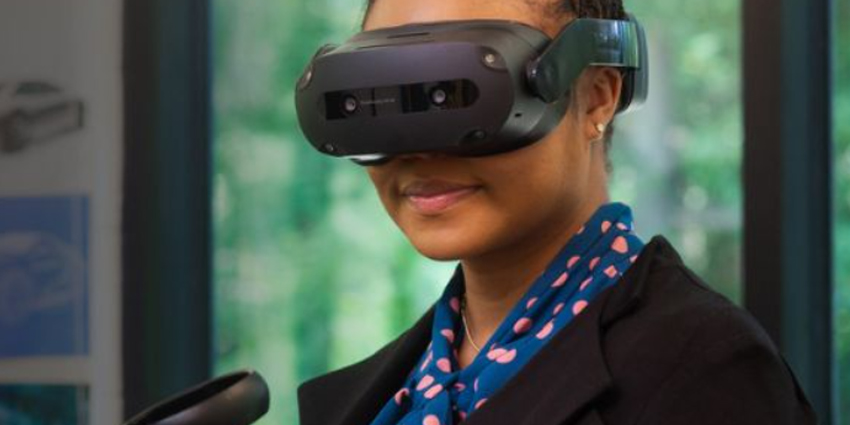Metaverse AI innovations could be the answer to the problems innovators are facing today.
Hype for the metaverse peaked last year after Facebook rebranded to “Meta”. Analysts even began predicting a lucrative future for metaverse technologies. According to Grandview Research, the global metaverse market will grow by around 41.6% CAGR up to 2030.
Yet despite ambitious investors and innovators, it still feels like a true “metaverse” experience is decades away. Companies are scrapping metaverse projects, and even Meta themselves seems to have shifted from a focus on digital environments to AI.
Some analysts believe the reason for this is the rising demand for generative AI pushing the metaverse to the sidelines. However, the reality may be that advanced AI solutions are precisely what the metaverse needs to flourish.
The Rising Impact of Metaverse AI
When it comes to the Metaverse, AI may form a crucial building block for future development. Just as concepts like the blockchain, 5G, and extended reality, artificial intelligence has an essential role.
Developing metaverse environments requires incredible computational resources and exceptional skill. The introduction of new Metaverse AI solutions has unlocked a new era of growth and innovation for Metaverse early adopters already.
In the gaming and entertainment industry, metaverse AI is helping companies like Second Life generate dynamic virtual worlds and environments that feel more realistic than ever. In the retail world, companies are investing in AI-powered virtual storefronts, which allow customers to browse through and buy products more immersively.
Even real estate and travel companies leverage AI-powered content and metaverse technologies to embed consumers in unique environments. As artificial intelligence algorithms become more advanced and ideas like spatial computing and LLMs transform the marketplace, the connection between AI and the metaverse is growing stronger.
Examples of Metaverse AI: Intelligence in the Metaverse
We’re still in the early stages of discovering what Metaverse AI can accomplish for the next generation of digital experiences. However, the opportunities are already beginning to present themselves in various unique ways. For instance:
Metaverse AI Optimizes XR Comfort
While the adoption of extended reality is increasing in the consumer and business landscape, developers still have challenges to overcome to deliver fantastic user experiences. The metaverse requires a lot of computing power to create comfortable, immersive environments for users.
Without the right level of power and a few intuitive solutions, we’re left with issues like VR sickness, preventing wide-scale adoption of the metaverse. One way Metaverse AI addresses this issue is to enable the more efficient use of computing resources.
With intelligent computer vision solutions, companies can implement foveated rending strategies, which reduce application performance bottlenecks. AI can also help to enhance images or audio in an XR environment to ensure people of all abilities can interact seamlessly with content.
AI Improves User Experience in the Metaverse
It’s not just improved comfort that can make Metaverse AI crucial to the future of immersive experiences. AI tracking in VR, AR, and Mixed Reality also directly impacts the user experience consumers have when moving through virtual worlds.
Computer vision, a component of AI, allows XR devices to recognize various parts of your body and follow your movements. With tools like the Apple Vision Pro, you can interact with content using eye movements and gestures rather than separate controllers.
AI forms the foundation of the spatial computing revolution for the metaverse, transforming the way people and computers interact. It’s a core component of making interactions with virtual content feel as natural as connecting with assets in the real world.
AI Transforms Interactions
As companies continue investing in metaverse technologies for everything from immersive collaboration to customer service, AI could be crucial to facilitating better interactions. Already, developers allow users to create their avatars to represent themselves in a digital space.
AI solutions can animate metaverse avatars uniquely, analyzing biometrics and expressing emotions through your virtual self. Thanks to the rise of generative AI, it’s even possible for companies to create virtual agents capable of interacting with users in a human format.
Avatars generated with AI can use natural language processing and machine learning to connect with users in their preferred language, and support them through various tasks. These tools can even translate and interpret what people say as they talk, producing live captions for accessibility.
AI Powers Personalized Metaverse Experiences
Countless customer-facing companies, from Nike to HSBC, have already begun creating unique experiences for consumers and fans in the metaverse. However, AI can make these experiences more unique, personalized, and engaging.
According to McKinsey, 71% of customers expect brands to deliver more personalized experiences. Another 76% of consumers say they’re frustrated by “cookie-cutter” interactions. However, developing scalable personal experiences in the metaverse would be a complex process requiring extensive human resource investment.
With AI, on the other hand, companies can create AI agents capable of responding intuitively to customer sentiment, drawing data from CRM systems, and more. AI solutions can even rapidly gather data from each metaverse interaction. Companies can discover new ways to improve their CX strategies without relying on old-fashioned technology like cookies.
AI Enhances Content Creation
As the next generation of the internet, there’s no doubt the Metaverse will rely heavily on content. However, creating content for the metaverse has proven to be a time-consuming and expensive process. This is particularly true in an age of significant talent and skill shortages.
Once again, generative AI has proven to be a saving grace here. Generative AI apps can be trained to compose character scripts for events and NCPs quickly. Art generation tools can help companies design virtual objects for extended reality experiences. It’s even possible to use generative AI to create entire virtual worlds.
Companies can pair generative AI algorithms with data from cameras, sensors, and other sources in the physical world to faithfully produce accurate digital twins. This paves the way for the recreation of offices, buildings, and unique environments in the digital world.
AI helps Secure and Simplify Transactions.
Blockchain technology, often associated with cryptocurrencies, is a crucial component of the metaverse. Blockchain tech is essential for powering transactions in the metaverse, making them safe and efficient. AI in blockchain allows for the creation of smart contracts.
These are programs stored on a blockchain that execute automatically when certain conditions are met. Thanks to these smart contracts, users can exchange goods and services safely.
Users can leverage smart contracts to trade crypto coins for metaverse real estate or accept payments to a crypto wallet for completing a task. AI could even form the foundation of the future of “meta work” and new forms of remote work.
AI Powers Research and Innovation
Many experts believe the Metaverse will be a valuable research and development platform. It can allow innovators to experiment with concepts in a safe environment. The addition of AI into the mix can make it easier to extract data from these experiments.
Through artificial intelligence, businesses can rapidly capture information with minimal need for data analysis. Moreover, teams can quickly ideate with AI, promoting collaboration and communication between remote staff members.
The data collected from metaverse experiments could be used to drive and inform generative AI solutions as they create ever-more immersive assets for human teams.
The Risks and Challenges of Metaverse AI
The use of increasingly advanced Metaverse AI solutions isn’t without its challenges. AI in all forms, particularly newer iterations like generative AI, comes with risks. Artificial Intelligence relies on vast amounts of data. Protecting the correct data will be crucial as consumers invest more into their digital identities within the metaverse.
It’s easy to assume we still have plenty of time to address these challenges before digital environments become commonplace. But that may not be the case. Gartner predicted that by 2026, 25% of people would already spend one hour a day in the metaverse.
The clock is ticking. As Tom Wheeler noted in his research, all forms of the metaverse are likely to be powered by AI.
Users will encounter advanced machines in this landscape regularly and interact with technologies still deemed experimental. As the metaverse looms closer, there will be an urgent need for tech giants and regulators alike to find ways of ensuring user safety.
Hopefully, the metaverse today will act as a proving ground for many future AI technologies. It may help developers to identify and remedy possible issues before we reach the stage of widespread adoption.
The Future of Metaverse AI
Increasingly, the impact of “Metaverse AI,” or artificial intelligence in the metaverse, is becoming impossible to ignore. As the potential of artificial intelligence continues to expand, the opportunities in the metaverse are growing at a similar rate.
While it’s difficult to know what the future of AI in the Metaverse might bring, we can say with some certainty that AI will be a fundamental cornerstone of the metaverse. Moreover, the metaverse may also play a crucial role in developing future AI solutions.
AI will create more powerful metaverse experiences, while the metaverse will give developers the safe environment they need to explore AI opportunities.







